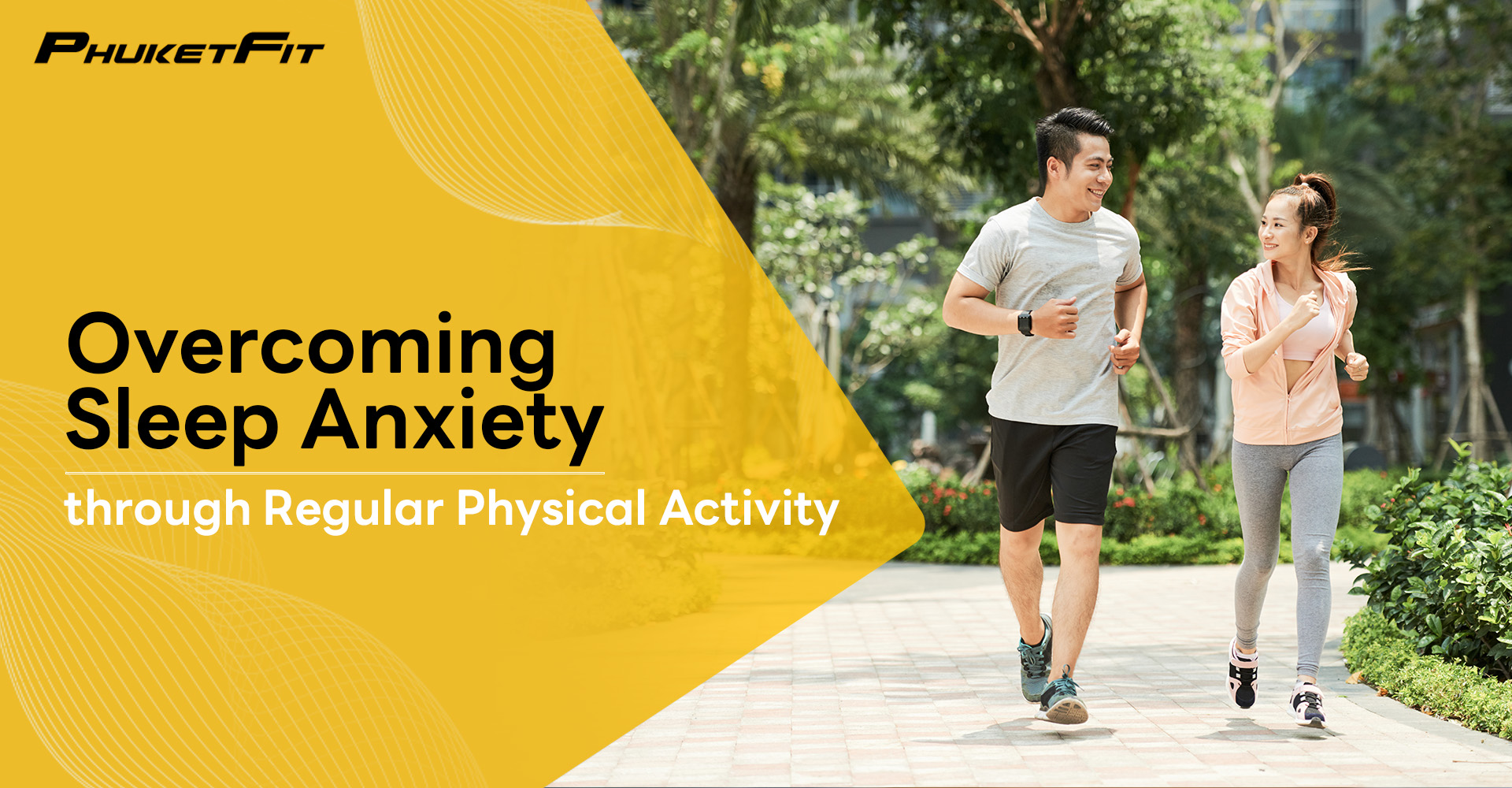
Overcoming Sleep Anxiety through Regular Physical Activity
Sleep anxiety is a common issue that many people face, impacting their ability to get the rest they need. From stress and worry to traumatic events and medical conditions, there are a variety of factors that can contribute to sleep anxiety. One effective way to combat sleep anxiety is through regular physical activity. Engaging in physical exercise not only benefits our physical health but also has a profound impact on our mental well-being. In this article, we will explore the relationship between physical activity and sleep anxiety, including the causes of sleep anxiety and the types of physical activities that can help alleviate it. We will also delve into the frequency of physical activity needed to combat sleep anxiety, as well as practical tips for incorporating regular physical activity into your daily routine. We will discuss other strategies for managing sleep anxiety, providing a comprehensive guide for those seeking relief. If you’re looking to overcome sleep anxiety and improve your overall well-being, this article is a must-read.
Key Points:
Physical activity releases endorphins which can help reduce symptoms of sleep anxiety and improve overall sleep quality. Regular exercise can help reduce stress and anxiety, which are common causes of sleep anxiety. Cardiovascular exercises, strength training, and mindfulness activities like yoga can all be effective in managing sleep anxiety.
What Is Sleep Anxiety?
Sleep anxiety refers to the experience of prolonged worry and stress related to the act of sleeping, often leading to difficulty falling asleep or staying asleep.
Individuals with sleep anxiety may struggle with racing thoughts, physical tension, and a persistent fear of not being able to get enough rest, which can significantly impact their sleep patterns and overall quality of life. This condition can stem from various underlying emotional and psychological factors, such as unresolved traumatic events, medical conditions, or chronic stress. The ongoing battle with sleep anxiety often leads to a cycle of worry about not being able to sleep, which in turn exacerbates the inability to fall or stay asleep.
What Causes Sleep Anxiety?
Sleep anxiety can stem from various sources such as stress, traumatic events, and underlying medical conditions, all of which contribute to heightened emotional and psychological distress surrounding sleep.
Stress, being one of the common triggers for sleep anxiety, can result from demanding work environments, personal relationships, or financial pressures. Traumatic experiences, including accidents, abuse, or major life changes, can leave a lasting impact on sleep patterns. Furthermore, medical conditions such as sleep apnoea, restless legs syndrome, or chronic pain disorders play a crucial role in disrupting normal sleep patterns, leading to increased anxiety and apprehension about falling asleep.
Stress and Worry
Stress and excessive worry are prominent factors that contribute to the development and exacerbation of sleep anxiety, often leading to heightened arousal and difficulty in achieving restful sleep.
When individuals experience chronic stress and persistent worry, their bodies may remain in a state of hyperarousal, making it challenging to relax and initiate sleep. This can result in disrupted sleep patterns, leading to insomnia and decreased overall sleep quality. The emotional toll of stress and worry can lead to feelings of helplessness and frustration, further worsening sleep anxiety. Over time, this cycle can significantly impact emotional well-being and overall quality of life, highlighting the importance of addressing stress and worry to improve sleep.
Traumatic Events
Traumatic events, whether recent or in the past, can trigger and perpetuate feelings of sleep anxiety, often manifesting as intrusive thoughts and heightened vigilance during bedtime.
This pattern often translates into difficulty falling asleep, frequent awakenings, and restless nights, contributing to a perpetuating cycle of emotional distress and sleep-related apprehension. The impact of trauma on sleep can lead to a hyperarousal state, where the body and mind remain on high alert, making it challenging to achieve a deep, restorative sleep. The fear of experiencing nightmares or flashbacks during sleep can further exacerbate sleep anxiety, causing individuals to avoid bedtime or resist falling asleep altogether.
Medical Conditions
Underlying medical conditions, such as insomnia and other sleep disorders, can significantly contribute to the development and exacerbation of sleep anxiety, often intensifying sleep-related concerns and preoccupations.
Insomnia, characterised by difficulty falling and staying asleep, can lead to heightened levels of anxiety and distress, impacting overall sleep quality. Other sleep disorders, such as sleep apnoea and restless leg syndrome, can disrupt the normal sleep cycle, further fuelling sleep-related anxiety. These conditions often perpetuate a cycle, where poor sleep due to the underlying medical conditions exacerbates anxiety, and heightened anxiety in turn impairs sleep quality, contributing to a worsening of symptoms.
How does regular physical activity help with sleep anxiety?

Regular physical activity plays a crucial role in alleviating sleep anxiety by promoting the release of endorphins, reducing stress and anxiety levels, and enhancing overall sleep quality.
Engaging in exercise triggers the production of endorphins, which are natural stress and pain-relieving chemicals in the brain. These endorphins not only improve mood but also help in reducing anxiety and promoting relaxation, ultimately leading to better sleep.
Furthermore, physical activity helps in regulating the body’s circadian rhythms, which can enhance the body’s ability to fall asleep and stay asleep. It reduces the levels of cortisol, the stress hormone, in the body, leading to a more relaxed state conducive to better sleep.
Releases Endorphins
Engaging in regular physical activity stimulates the release of endorphins, the body’s natural ‘feel-good’ hormones, which can help alleviate the symptoms of sleep anxiety and promote a sense of well-being.
When an individual engages in activities such as running, swimming, or even dancing, the body responds by releasing endorphins. These neurotransmitters interact with receptors in the brain to reduce the perception of pain and trigger positive feelings. Not only does this contribute to physical well-being, but it also plays a significant role in emotional wellness.
The release of endorphins during exercise has been linked to a reduction in stress, anxiety, and symptoms of depression, providing a natural means to uplift mood and combat feelings of sleep-related unease.
Reduces Stress and Anxiety
Regular physical activity has been shown to reduce stress and anxiety levels, providing individuals with a natural and effective means of managing the emotional burdens associated with sleep anxiety.
Engaging in activities such as running, yoga, or swimming can lead to the release of endorphins, which play a crucial role in alleviating stress and promoting a sense of well-being. Physical exercise can improve sleep quality, enabling individuals to enjoy deeper, more restorative rest, which is essential for combating anxiety-related sleep disturbances. The sense of accomplishment after completing a workout can foster a positive mindset, reducing feelings of helplessness and enhancing emotional resilience. Participating in team sports or group fitness classes can foster social connections and support networks, further bolstering mental well-being.
Enhances the quality of sleep
Regular physical activity has been found to significantly improve sleep quality, potentially aiding in the regulation of melatonin levels and promoting better sleep efficiency, thus contributing to the management of sleep anxiety.
Engaging in regular physical activity, such as:
- cardiovascular exercises
- strength training
- yoga
can positively impact the body’s internal clock, helping to synchronise melatonin secretion with the natural sleep-wake cycle. This synchronisation is crucial for ensuring a restful and rejuvenating sleep, which in turn can alleviate symptoms of:
- insomnia
- sleep disorders
- restlessness
Physical activity can reduce sleep anxiety by releasing endorphins and lowering stress hormones, creating a conducive environment for relaxation and better sleep.
What Types of Physical Activity Can Help with Sleep Anxiety?
A variety of physical activities, including cardiovascular exercises, strength training, and mindful practices such as yoga, can effectively contribute to the alleviation of sleep anxiety and the promotion of better sleep health.
Engaging in cardiovascular exercises like running, swimming, or cycling can help reduce stress and anxiety, leading to improved sleep quality. Similarly, strength training activities, such as weightlifting or resistance band exercises, can enhance physical well-being and aid in achieving restful sleep. Practising mindfulness activities such as yoga or meditation can calm the mind and body, reducing the symptoms of sleep anxiety and fostering a more peaceful sleep routine.
Cardiovascular Exercises
Engaging in cardiovascular exercises, such as brisk walking or cycling, can have a positive impact on sleep anxiety, with moderate-intensity activities being particularly beneficial in promoting better sleep duration and quality.
Studies have shown that regular cardiovascular exercises not only help in alleviating sleep anxiety but also contribute to enhancing the overall sleep pattern. Moderate-intensity aerobic activities, like swimming or running, can regulate the sleep-wake cycle and aid in achieving restorative sleep. Engaging in cardiovascular exercises leads to a decrease in the time taken to fall asleep, thus improving sleep efficiency and overall sleep quality.
Strength Training
Incorporating strength training into one’s exercise routine can aid in the management of sleep anxiety, with vigorous resistance workouts potentially contributing to the reduction of sleep-related disorders and symptoms.
Regular engagement in strength training has been linked to improvements in overall sleep quality and duration. The physiological response to intense resistance exercises can lead to the release of endorphins, which may have a calming effect on the mind and body, promoting relaxation conducive to better sleep. The development of muscle strength and endurance through resistance training can enhance physical well-being, potentially alleviating factors that contribute to sleep disturbances. Establishing a consistent strength training routine could offer a natural and sustainable method for those dealing with sleep anxiety and related issues.
Yoga and Mindfulness Activities
Practising yoga and engaging in mindfulness activities can promote relaxation and improve sleep onset and efficiency, making them valuable components of a holistic approach to managing sleep anxiety.
Yoga and mindfulness practices have been shown to reduce stress and quiet the mind, both of which are essential in alleviating sleep-related concerns. Deep breathing exercises and gentle stretches enhance physical relaxation, while mindfulness meditation cultivates a peaceful state of mind, fostering a conducive environment for restful sleep.
The mind-body connection nurtured through these practices aids in addressing underlying emotional disturbances that often contribute to sleep anxieties. By developing a heightened awareness of thoughts and emotions, individuals can gain better control over racing thoughts and anxiety, leading to improved sleep quality and overall emotional well-being.
How often should one engage in physical activity for sleep anxiety?
The recommended frequency of physical activity for addressing sleep anxiety may vary based on individual needs and preferences, with personalised approaches offering flexibility in establishing an effective routine.
It is important to consider the individual’s overall health, fitness level, and any potential medical conditions when determining the appropriate frequency and intensity of physical activity for managing sleep anxiety.
Some individuals may benefit from daily physical activity, while others may find that three to four times per week is more suitable for their lifestyle and recovery needs.
Personalised routines should prioritise consistency and sustainability, allowing individuals to engage in activities they enjoy, whether it’s yoga, walking, swimming, or participating in group fitness classes.
Recommended Frequency
For adults experiencing sleep anxiety, engaging in regular physical activity, as recommended by credible sources and research evidence, is essential for promoting better sleep health and emotional well-being.
Regular physical activity has been shown to improve sleep quality and reduce the symptoms of sleep disorders. The American Heart Association and the American College of Sports Medicine recommend at least 150 minutes of moderate-intensity exercise or 75 minutes of vigorous-intensity exercise per week. By meeting these exercise guidelines, individuals can experience improved sleep patterns, reduced stress, and enhanced overall quality of life.
Personalised Frequency Based on Individual Needs
Tailoring the frequency and nature of physical activity to suit individual needs and address specific symptoms of sleep anxiety can significantly enhance the effectiveness of exercise as a complementary approach to improving sleep quality.
Personalised exercise plans offer a strategic advantage in managing sleep anxiety as they cater to the unique physiological and psychological requirements of each individual. By identifying the most suitable type, intensity, and timing of physical activity, tailored routines can effectively address the underlying causes contributing to sleep disturbances, such as stress and restlessness. This customisation optimises the impact of exercise on sleep health, ensuring that it not only promotes relaxation but also energises the body when needed, ultimately promoting a more restorative and rejuvenating sleep.
Tips for Incorporating Regular Physical Activity into Daily Routine
Incorporating regular physical activity into daily routines can be facilitated through simple strategies such as scheduling exercise at optimal times, choosing enjoyable activities, and avoiding vigorous workouts close to bedtime.
Many individuals find it beneficial to squeeze in short bursts of physical activity throughout the day, such as taking a brisk walk during lunch breaks or doing a quick workout before starting the day. This allows for a more flexible approach to staying active without overwhelming one’s schedule.
Engaging in activities that are personally enjoyable and fulfilling makes it easier to maintain a consistent exercise routine. Whether it’s dancing, swimming, or playing a sport, finding activities that bring joy can significantly increase the likelihood of sticking with them long term.
Other Strategies for Managing Sleep Anxiety

Along with regular physical activity, implementing relaxation techniques, maintaining consistent sleep schedules, and seeking professional guidance can contribute to the effective management and reduction of sleep anxiety and related sleep disorders.
Engaging in practices such as meditation, deep breathing exercises, or progressive muscle relaxation can help calm the mind and body, promoting a sense of tranquillity before bedtime.
Adhering to a consistent sleep schedule by going to bed and waking up at the same time each day can regulate the body’s internal clock, making it easier to fall asleep and wake up naturally.
Additionally, seeking professional support from a sleep specialist or therapist can provide valuable insights and personalised strategies for addressing and alleviating sleep-related concerns. These experts can offer cognitive-behavioural therapy for insomnia (CBT-I), which has shown to be particularly effective in improving sleep quality and reducing anxiety related to sleep.
Frequently Asked Questions
What is sleep anxiety and how does it affect my sleep?
Sleep anxiety is a type of anxiety disorder that causes excessive worry and fear about the quality and duration of sleep. It can lead to difficulty falling or staying asleep, which can significantly impact one’s daily functioning and overall well-being.
How can regular physical activity help in overcoming sleep anxiety?
Regular physical activity has been shown to reduce symptoms of anxiety and stress, which are often the root causes of sleep anxiety. Exercise also promotes the release of endorphins, which can help improve mood and promote relaxation.
What types of physical activity are most effective in reducing sleep anxiety?
There is no one specific type of physical activity that is most effective in reducing sleep anxiety. Any form of exercise that you enjoy and can do regularly can help, whether it’s running, yoga, or even walking.
How often and how long should I exercise to see improvements in my sleep anxiety?
The frequency and duration of exercise needed to see improvements in sleep anxiety may vary from person to person. However, experts generally recommend engaging in physical activity for at least 30 minutes, 3-5 times a week.
Can exercising too close to bedtime worsen sleep anxiety?
While regular physical activity can help with sleep anxiety, exercising too close to bedtime may have the opposite effect. This is because exercise can increase energy levels and make it harder to fall asleep. It’s best to avoid rigorous exercise 2-3 hours before bedtime.
Are there any other benefits of using exercise to overcome sleep anxiety?
Aside from reducing anxiety and improving sleep, regular physical activity also has numerous other benefits, including improved cardiovascular health, increased strength and flexibility, and better overall mood and well-being.
